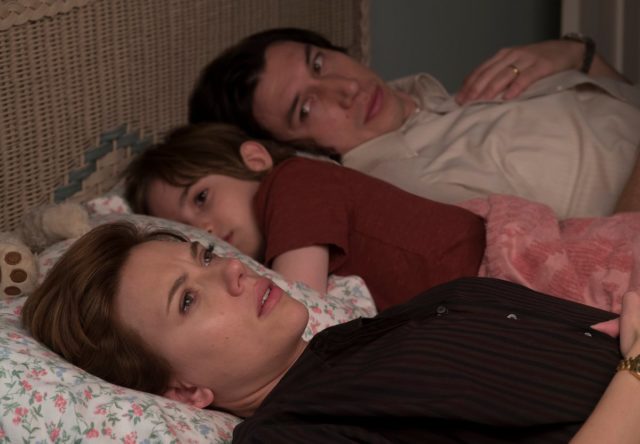
It all started so well. There was love, and there was kindness. There was understanding, and there was support. And then one day, there wasn’t. The supports were taken out, kindness gave way to cordiality, and romantic love dissolved into something platonic. Something familial.
Yet, it was all there. Once. It’s a common refrain you hear when a friend tells you of their breakup. It’s a common conundrum when you are that friend. We were happy once. Weren’t we?
So opens Marriage Story, the latest feature film from writer/director Noah Baumbach. Presented as a shared montage of memories between Charlie (Adam Driver) and Nicole (Scarlett Johansson), Marriage Story’s opening uses voiceover narration and fleeting moments to capture and construct a relationship we will never see. It’s kind of like the opening of Up. And, like the animated classic, the marriage hinted at somehow feels fuller and more real than most of our real-life relationships.
But there is no death here, only divorce. Well, sort of. As Charlie’s lawyer Bert Spitz (Alan Alda) describes it: Divorce is like a death without the body. Maybe it’s worse. As the movie weaves its way through the Kafkaesque mines of the legal system, Charlie longs for a cleaner break. “I feel like a criminal,” he says to no one in particular.
A criminal guilty of no crime, and a death with no body — Marriage Story might be the year’s funniest film. And not in an ironic way (though it does have a good amount of that as well) but because life is a combination of the absurd and the ridiculous. When the love is there, inside jokes and odd behaviors can be chalked up to affection and meaningful communication. When the love leaves, then it’s all just odd.
A great deal of the humor emanates from Driver and Johansson’s performances — partly from the script, partly because their characters have no better way of dealing with the issues at hand. The supporting cast is just as good: From Julie Hagerty as Nicole’s mother — who refuses to give up her relationship with Charlie — to the three lawyers representing Charlie and Nicole: Alda, Laura Dern and Ray Liotta.
But Baumbach never loses the thread of tragedy in his story. Working with cinematographer Robbie Ryan, the two gradually move from spaces cluttered with life and love to bland sterility and phoniness. You can almost feel the walls closing in on Charlie and Nicole. Imagine how those walls look from their son’s eyes.
Baumbach never fully reveals what brought this marriage to a halt, but there are plenty of possibilities. We never see any of those possibilities; we only hear of them. It’s up to us to decipher who is being truthful and who is embellishing. Who is guilty and who is ready to move on.
Why, then, call a movie so explicitly about divorce Marriage Story? Because there is no divorce without marriage, or because you are married the whole time you go through the divorce? Maybe. Or maybe because a marriage never belongs to just the two parties engaged. There’s always more: Friends, family and, most importantly, the children caught in the middle.
ON THE BILL: Marriage Story on Netflix.














